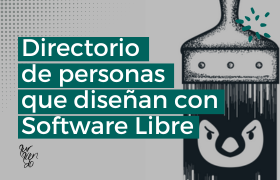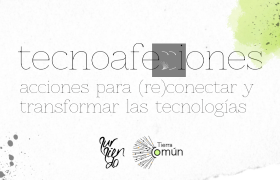The challenge of a feminist technology: a necessary reconfiguration

Some time ago we started saying that the Internet isn’t neutral. Neither are technologies in general. It isn’t neutral respecting the software, social media… nor is it for activism. Montse Boix says “their are a lot of people that dedicate themselves to technology but there are very few, unfortunately, that sum up technology with a social point of view and there are even less people that do this with feminism as well”. This is a huge challenge.
Montse Boix sums up the term cyberfeminism by “doing feminist activism on line”. The intention is not only to increase the number of women on line, rather than having this inclusion come about from a clear feminist political approach.
There is a long history of advances toward hacking patriarchy “Cyberfeminists have already understood the importance of combining efforts in technological education as crucial for women. But this education needs to be put in context with in a critical feminist analyses and a discourse about women, web culture and politics, and the economy of pan-capitalistic labor”.
Free software, for example has an emancipatory political perspective, it stands from the view point of liberties. Nevertheless, regarding gender the different actors and spaces working around these issues are still quit reluctant on questioning patriarchy. In “Integrating a gender view to Free Software, a challenge for the democratization of technology” it is assured that “The feminist movement has historically been betting on sharing knowledge and feminism has systematically denounced the use of knowledge to exclude others, a strategy used historically in the development of technology, written in male”.
Even physical places like hacker-spaces “do not necessarily result in spaces where everyone feels safe and assured to hack, learn, socialize or experiment”. Responding to this the proposition is that secure spaces should be based on common values that permit everyone to flourish and empower themselves at the time community is being created. To start of, the most important thing is to occupy the place. Of course, not occupying it in whatever sense, but if we are not even there it is hard to rethink the hows of the next steps.
To think technologies in a feminist cue does not only imply knowing if women are present in them but also to analyze the products, contents and relations generated, as well as visibilizing discrimination, and making evident “the social, economical and political importance that our technological choices have”.
Access and participation

The few approaches on these topics do not have so much to do with the (dis)interests of women themselves but with the fact that the distribution of other tasks (fundamentally those that have to do with nourishing) still fall among us as women, at the same time that a situation of multi-discrimination (for reason of gender, geography, age, economy, linguistics, etc.) is still in place. There is no time to experiment, share, develop, meet… our alterna
tives or choice possibilities tend to be much less and, most importantly, there is barely space for trial and error. There is no time.
That is why this topic
needs to inquire in different processes such as access and tecno-social immersion that contemplate technological and social aspects like motivations, facilitating factors, conditions of use, development and participation of women in technological spheres among with the mechanisms of self-inclusion that women develop to self include themselves and by this modify TICS.

There is still an existing distance in access to technology. But access does not only depend on available hardware (cellular phones have gone a long way shorting the gap in this sense). Access also has to do with the type of information available (what formats, in what languages), with a digital culture and digital education. As they say in Feminist Contributions to Think Technologies: the case of OLPC and SugarLabs in Colombia, we are interested in the “search to de-construct the imagery that women and technology (in general) are incompatible (…) it is notary that certain projects and developments of TICS that are directly associated with social intervention processes with an educational character, for example, are of greater interest for women”. In that same report it is pointed out that for the implementation and success of the plan one laptop per child the participation of women from local free software communities was medular.
In this article the whole implementation project is analysed in depth (it is worth reading it completely) and points out that “the feminist critic to technology will aim not only to highlight what is going on with men and women in TIC territory, but to reconfigure the territory in itself, according to these premises of partiality, heterogeneity and contingency”.
Besides, self-imposed prejudices play an important role. Technologies are for people; so, we can transform the “I don’t know much about this” into a determination to learn (among with others). Once we are there, we need to inform and inform our selves, express opinions, connect, make links, interweave, teach, highlight, support, make noise (like Feminist Memes, a project that was born almost spontaneously and that has a huge reach: it uses one of the most utilized formats of social media but with a provocative language) and a long etcetera. The mere fact of letting ourselves make public our curiosity, question authority and stereotypes while sharing the results with the community that surrounds us could be an effective mechanism to help reduce patriarchy and even-out other unbalanced economical and social relations.
On city streets and information avenues we need to stand alert of male chauvinism as well as to micro-machismos, those subtle behaviours of domination that go about almost “unnoticed” and plague relations. First of all, to confront this externally we have to do so internally and by this understand our own contradictions. A long and hard path that is a constant of every day life. Maybe that is why the approach and constant collaboration with men who are working on their gender roles seems to us necessary, as well as with any sensible person towards plurality, tolerance, and no discrimination. In the face of reproduction of the same topics, dissenting and thundering voices!
Participation and activism

The project Searching for #activistwomen retake the voice of Marga Padilla when she maintains that “the technological revolution is producing changes in the distribution of power. Power does not disappear, but it’s positions suffer a shift” and that is why we have to “cease this changes tracking down the situations in order to detect which of these soft spots are weakening patriarchy”.
Internet is horizontal and democratizing. But not per se. In order for those premises to come through we have to participate, debate, learn, dialogue, work there, work outside, denounce, convoke, know, know each other… There are no mediators. Or at least those are the possibilities given out by the web. That is why the self inclusion processes that have been emerging in these times are so important. But in order for this to happen we have to empower ourselves on a daily basis, something we are not use to.
Tomorrow the initiative #ImagineFeministInternet (#ImaginaInternetFeminista) proposed by Take Back The Tech (Dominemos las Tecnologías) comes to an end, where a global conversation for a feminist Internet took place. Among the conversations we met up with Paola Güiza López who shared her view point about the importance of “empowering women by modifying roles towards the Internet as creators-users” and for this she recommended the “tool to learn to program intuitively”.
Before (during or after) we need to understand that in this environment we are not alone. That we have to give as well as receive. If we want to be listened to we have to know how to listen, be able to have solidarity with others. Share our process but also get involved with that of others. If we don’t want to repeat the annoying publicities we have to take the necessary time to sit down and listen. Use a communication that creates bonds, generate communities and caring spaces, respect and empathy.
We can no longer separate the on line from the off line. We are in both spaces. But in each one in accordance to its own language. Women on the web are many times crossed by the same behaviours they find on the streets. It seems that in order for us to raise our voice we have to pay a price. Attacks toward bloggers and feminist activists are usual (yet not normal).
Activism and web harassment
Cyber-harassment “is the use of TICS to monitor, trace and harass someone, provoking anguish and fear for there personal security”. These kind of practices “can severely limit women’s possibility of participation and free use without apprehension or fear of TICS”. Not because of this should we stop being present.
The facebook page Acid Feminists, a “project of active struggle against the illusion of equality and heteropatriacal terrorism”, is still disappearing. Now they have a personal profile from which they communicate. A while ago in a note for a Spanish newspaper they confessed “when you want to develop your job in this web, censorship is a risk you assume. From the beginning we have had pictures deleted, penalizing administrators accounts having them blocked for days, weeks or months”. This normalization of the risks we have to assume for expressing our point of view when far from the norm is, at least, terrible. Despite the attacks they have been receiving, for Irene Redondo, the author of the blog, what has to be done is clear: “Feminist struggle is on the street; but the Internet is a good platform for diffusion, exposing, creation of networking, or for getting in touch for other initiatives, why should we give up this platform?
On the other hand there is the topic of security and privacy on the web (you can give a stroll in the Digital Security and Feminism Workshop: elements for the debate and practices of security in cyber-space). Free software with it’s philosophy and practice is a great ally alongside with free webs in which we have to learn to participate. In them, much more than in commercial webs, dialogue is more fluid and constant. The hows, formats, the learning and even the discussions are established with much more assiduity and constancy.
So, in order to democratize technology it is indispensable to incorporate other view points, how can we avoid the monopoly of the word? Well talking, permitting the plurality of languages, voices, stories, projects, reading about them and also promoting them, representing ourselves. Leave fear and prejudices behind to be on the net whoever we want to be. We have to now the tools in order to know how to act. In the face of the unknown, that is frightening and paralysing, the proposal is to understand, to get encouraged and in movement. Because besides, one of the advantages of the Internet is that we can adopt multiple identities and explore from there. When before was it possible to be various I’s at the same time? An opportunity not at all despicable.




